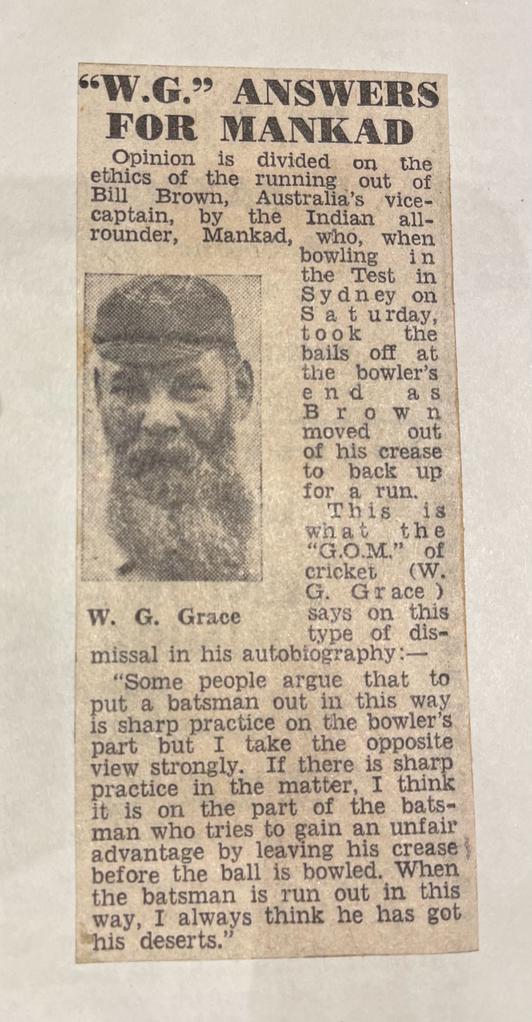There has been a lot of talk on Mankading off late. Finally the ICC has ruled that it is not “mankading” but a run out. In fact, it was the biggest take away in the aftermath of the Deepti Sharma incident when she, very justly, ran out Charlotte Dean giving India a much needed victory. However, what is little known is that way before 1947-8 when Vinoo Mankad had run Bill Brown out in Sydney, the father of cricket, WG Grace, had come out in support of such a dismissal and called it a fair run out. Yes the paper cutting of Grace’s comment published in his autobiography is still very much there in the Melbourne Cricket Club library and collection and was shown to us by the librarian David Studham. “I felt it is an important piece of history for you because there has been so much talk about Vinoo Mankad off late. We have many such scrapbooks in our collection and one is dedicated to the 1947-8 tour and included paper cuttings from all the leading Australian newspapers and was collected by Stan Richards”, says Studham.
The scrapbook is excellent. It has newspaper reports from the time the Indians landed in Australia and includes detailed reports of every Test match played during the tour. Interestingly, for each Test match newspapers dedicated 5-6 pages of coverage each day and when it came to the Bill Brown incident the debate raged on for days. In fact, the day after the incident has very little coverage of it except the scorecard and a small news item, which says Mankad had run Brown out. However, things change the very next day when many had started to call it unfair play. That’s when WG Grace’s comment in his autobiography on a dismissal like this, which was totally in favour of Mankad and calling it a fair run out was published by local newspapers. Grace had said so because such a dismissal was within the rules of the game. In fact, he went on to say that what was within the rules was within the spirit.
What is interesting is how despite the publication of WG’s comment in support of Mankad the debate got twisted and for decades the dismissal was called Mankading, which had a negative connotation to it. Clearly the media, read white media, which dominated cricket writing at the time did not like the fact that Mankad was starting to get support and twisted the narrative against him. It is only recently that things have started to change again, and the ICC has weighed in favour of Mankad.
For us it was fascinating to see that the MCG library has preserved this scrapbook with meticulous care. In fact, they too support Mankad in this issue as mentioned by David Studham. “He absolutely played within the rules of the game and that’s why this newspaper report is so very important. It demonstrates with authenticity that WG had already spoken about such a dismissal”, said Studham.
The debate continued for about a week and opinion was divided in Australia among the fans. While some supported the WG argument and hence supported Mankad, others were of the opinion that he had done something that was against the spirit of the gentleman’s game. In sum, Mankad had become the talk of the tour and had created a news story that has had a shelf life of more than 75 years.
The MCG library also has Indian cricket artefacts from the 1932, 1936 and 1946 tours of England not to mention the 1947-8 tour down under. Most importantly they will also keep the library open for every Indian cricket fan who come to the G on Sunday to watch India play Zimbabwe. Official ticket sale figures, as David Studham says, is 88,700 and will only grow to 90k by the 6th of November. With a lot of Tendulkar, Gavaskar and other historical artefacts on display on Sunday, fans will do well to visit the library either before or during the game. And if they do so they can surely ask to see the WG press interview and see for themselves what was said at the time on “Mankading.” Or rather, the Bill Brown run out.




